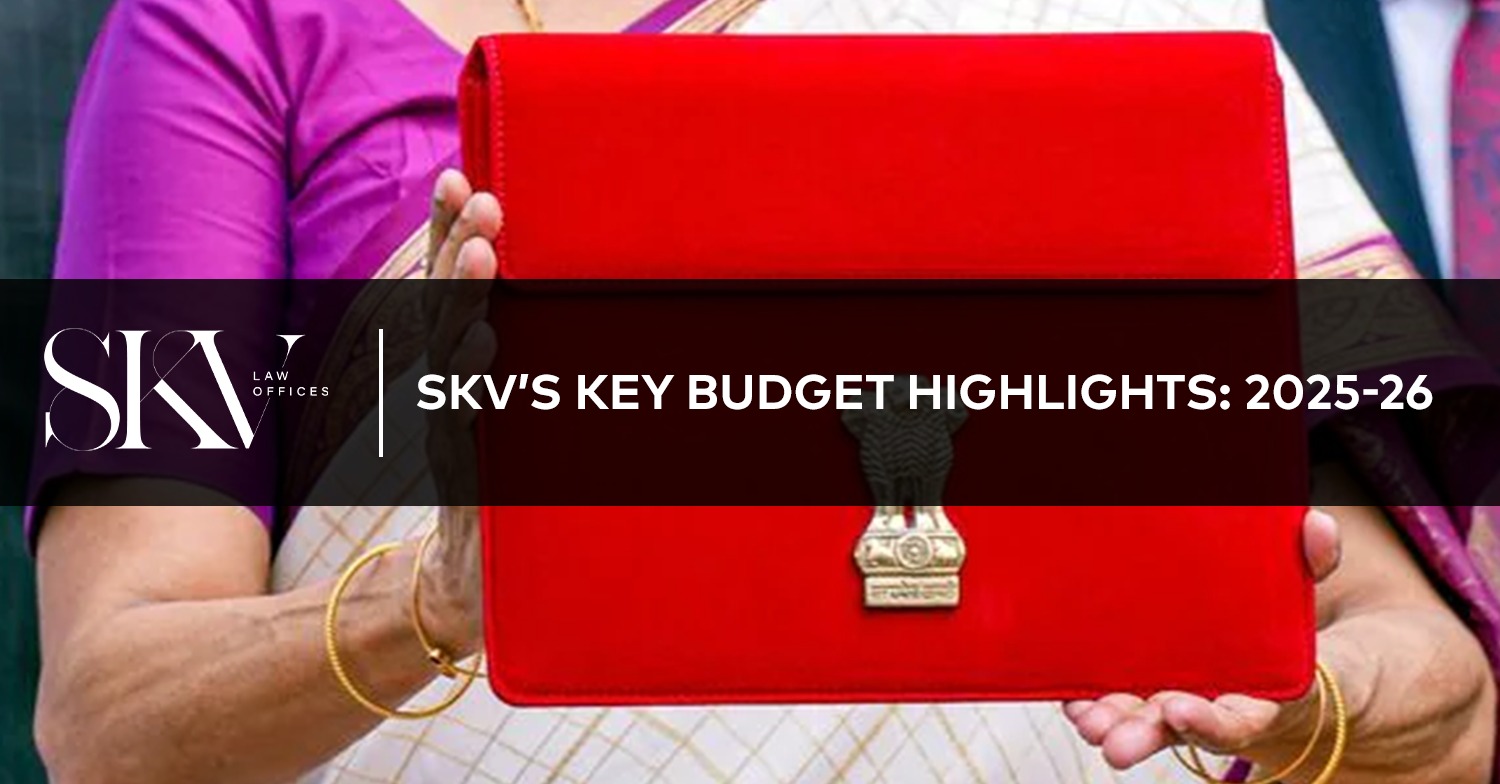SKV’s Key Budget Highlights: 2025-26
01.02.2025
The Union Budget 2025-26 was read out by the Hon’ble Finance Minister on 2nd February 2026. This budget, was silent on major questions of policy and government incentives of renewable energy, did provide new execution road maps and introduction of incentives for domestic production of vital parts required for renewable energy infrastructure. The Budget’s larger focus was on providing more bolstered support to Micro, Small and Medium Enterprises (MSMEs), and providing more regulatory support to the individuals engaged in business activities in the tech-commerce sector. The major highlights from said sectors are highlighted below.
Energy Sector
The budget introduces a clean technology manufacturing initiative that includes support for domestic production of solar PV cells, EV batteries, motors, controllers, electrolysers, high-voltage transmission equipment, and grid-scale storage batteries. The initiative includes policy support, execution roadmaps, and monitoring frameworks for central ministries and states.
States that implement electricity distribution reforms will be allowed additional borrowing of 0.5% of their GST revenues. Transmission capacity is proposed to be expanded, and public-private partnerships in power infrastructure are being encouraged.
A Nuclear Energy Mission for Bharat has been announced with a target of 100 GW of nuclear power by 2047. Amendments to the Atomic Energy Act and the Civil Liability for Nuclear Damage Act will be introduced to facilitate private sector participation. The government has also announced the development of five indigenously designed Small Modular Reactors, which are expected to be operational by 2033.
Furthermore, the Ministry of Finance has made a proposal for a high-level committee for regulatory reforms for review of all non-financial sector regulations, certifications, licenses, and permissions. There is a trust deficit in economic governance, and transformational measures such as this will enhance the ease of doing business, especially in sectors like energy infrastructure, where compliances have to be met for extremely novel technology. The high-level committee is directed to make its recommendations in a year, which may have a direct and pivotal impact on energy, telecom, and technology sectors.
MSME Sector
The budget introduces changes to the MSME sector, increasing the investment threshold for micro enterprises by 2.5 times and for small enterprises by 2 times. A customized credit card facility has been announced for MSMEs registered under the Udyam Portal, allowing access to credit up to ₹5 lakh. A ₹10,000 crore fund for startups has been introduced to support early-stage businesses. India Post will be transformed into a logistics entity to improve supply chain support for MSMEs and women entrepreneurs. A scheme has been announced to assist five lakh first-time women entrepreneurs.
The government has also introduced a manufacturing initiative focused on toy production. The scheme aims to develop manufacturing clusters and skilled labor in this sector. A food processing ecosystem is planned in the Eastern region to enhance value addition and create employment opportunities.
Regulatory processes will be streamlined to reduce compliance burdens on MSMEs. An urban challenge fund of ₹1 lakh crore has been proposed, part of which will be accessible to MSMEs engaged in municipal services and urban development projects.
Tech Sector
The budget allocates ₹500 crore for a Centre of Excellence in Artificial Intelligence for Education. Additional AI centres focusing on agriculture, healthcare, and sustainable urban development have been established. The government aims to integrate AI and emerging technologies into various sectors.
Broadband connectivity will be extended to all government secondary schools and Primary Health Centres in rural areas under the Bharat Net project. National Centres of Excellence for Skilling will be established in collaboration with global institutions to enhance digital skills.
A regulatory framework for tech startups and innovation-driven enterprises will be reviewed to align with global best practices. A High-Level Committee for Regulatory Reforms will assess licensing and compliance structures. The government has proposed a light-touch regulatory framework aimed at updating regulations for the technology sector.
The budget includes provisions for UPI-linked credit cards with a ₹30,000 limit for gig workers and formalized healthcare benefits for online platform workers. A Gramin Credit Score Framework will be introduced to improve access to credit for rural entrepreneurs and Self-Help Group members. A centralized KYC registry will be rolled out in 2025 to streamline digital transactions.
Conclusion
The Budget 2025-26 introduces several measures for the MSME, energy, and technology sectors. Changes in investment thresholds, credit support, and regulatory processes impact MSMEs. Energy sector initiatives include clean technology manufacturing and nuclear energy expansion. The technology sector sees continued investment in AI, broadband infrastructure, and regulatory reforms. The budget also addresses digital finance and gig economy-related policies. These measures are expected to shape the economic landscape in the coming years.


